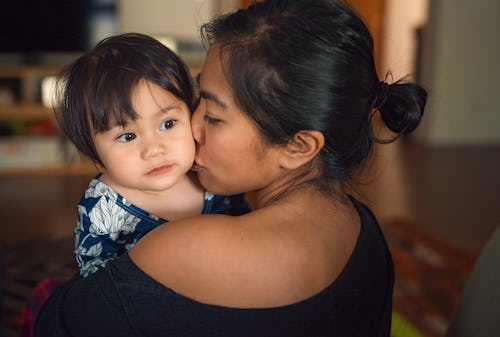
There are some bodily functions that are downright adorable when a baby does them. Even an ill-timed toot can be hilarious — just as long as it doesn’t come with a complete diaper blowout. But when your baby coughs, even once, it somehow triggers a mental countdown of when your baby will become sick, and you’ll both be sitting in a pediatrician’s office. From exactly what a dry cough is, to what they sound like and what they may mean, our baby dry cough guide might give you an idea of what ails them, and how to help them feel better.
What does a dry cough sound like?
Coughs have one goal, and one goal only: To protect your airways and lungs from any irritants. And that might explain why some coughs can clock in between 10-15 mph in terms of their ability to remove airborne pathogens from your body, per a PubMed study. But, if you think that all coughs sound the same, think again. Some are wet, some sound like a seal barking, and others, like a dry cough, can sound hollow. “A dry cough is often due to irritation in the upper airways and is typically a more consistent-sounding cough,” Dr. Natalie Thoni, a board-certified pediatrician at the Orlando Health Arnold Palmer Hospital for Children explains to Romper. “Dry coughs, which are not productive, are often due to the feeling of a tickle in the throat secondary to this airway irritation.”
Reasons why your baby has a dry cough

If your kid coughs once or twice, it’s probably not a cause for concern. But when it is repetitive or is accompanied by other symptoms, chances are your baby might be getting sick — or already is. “We often see that a baby will have cold symptoms (runny or stuffy nose) and a cough that may start out as 'productive,' meaning that it produces mucus,” Dr. Cherilyn Cecchini, a board-certified pediatrician in New York City explains. “Then the cough will stick around and become a dry, lingering cough, which can happen when your child has the common cold or other respiratory infections like the flu or Covid-19.” As your child’s sinuses drain, it can become irritating to the upper airways and lead to a dry cough.
A baby’s dry cough can also occur not because of illness, but things that are in your home. “Dry coughs are also often seen when children have allergies or are exposed to other airway irritants like smoke,” adds Thoni. “These things can cause inflammation and irritation in the upper airways leading to a dry cough.” Asthma is also something that can lead to a dry cough, often occurring at nighttime, adds Thoni.
Even what your baby eats can potentially cause a dry cough. “Gastroesophageal reflux (when the contents of the stomach push up into the esophagus) can cause not just heartburn, but a dry cough,” says Cecchini.
What if Baby has a dry cough and no fever?
Sneezing, a runny nose, and overall irritability can sometimes come with a cough. But if Baby has a dry cough and no fever, it could mean a few different things. “It might mean that your baby had an upper respiratory infection that their immune system has fought off and now they are left with a persistent cough that should eventually go away on its own after one to two weeks,” explains Cecchini. Alternatively, it could be that your baby’s cough is coming from something that isn’t an infection, like allergies or reflux.
Fortunately, you can treat a dry cough that isn’t accompanied by a fever right at home. “Humidified air as well as hydration with plenty of fluids is often very helpful for coughing,” says Thoni. “If the dry cough is persistent and not improving, or if your child develops a fever with a dry cough, they should be evaluated by their doctor.”
When to call the pediatrician
Although coughing is a sign that your baby’s body is doing its job, a dry cough in babies can occasionally turn into something more serious, especially if it’s affecting your baby’s ability to breathe. “You should call your doctor if your child develops a new fever while they have a cough, if the cough is getting worse or become more productive, if your child is unable to drink or stay hydrated, or if you notice the cough is causing any trouble breathing,” says Thoni. And if their cough does begin producing phlegm, be sure to look at the color of it, since blood-tinged phlegm (also known as hemoptysis) can be a result of an underlying viral or bacterial respiratory infection, researchers found. It’s rare in children, but if you do start seeing red, (literally), you should call your child’s doctor right away.
For the most part, if your baby has a dry cough, it’s usually related to a viral infection that their body is battling or starting to get over. Just keep an eye on your baby’s dry cough so that it doesn’t worsen, and when it finally passes, you’ll all breathe a bit easier.
Studies referenced:
Kwon, S., Park, J., Jang, J., Cho, Y., Park, D., Kim, C., Bae, G., Jang, A. (2012) Study on the initial velocity distribution of exhaled air from coughing and speaking, Chemosphere, https://pubmed.ncbi.nlm.nih.gov/22342283/
Ittrich, H., Bockhorn, M., Klose, H., Simon, M. (2017) The Diagnosis and Treatment of Hemoptysis, Deutsches Arzteblatt International, https://www.ncbi.nlm.nih.gov/pmc/articles/PMC5478790/
Experts:
Dr. Natalie Thoni, M.D., a board-certified pediatrician at the Orlando Health Arnold Palmer Hospital for Children
Dr. Cherilyn Cecchini, M.D., a board-certified pediatrician in New York City
0 comments:
Post a Comment